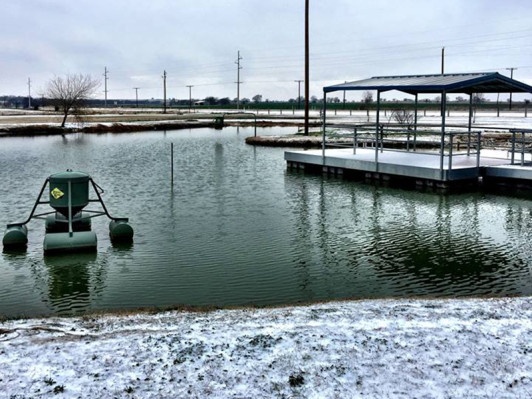Winter can be a tricky time for anglers and pond owners alike. As temperatures fall, ponds often become noticeably inactive. Surface action disappears, trusted lures stop producing bites, and fishing success can drop off dramatically. For pond owners, this seasonal slowdown can be especially concerning.
In some cases, the change is so extreme that it may look like a fish kill, leading many pond owners to worry they’ve lost their fish entirely.
So what’s really happening beneath the surface?
Are the fish dead—or are they hibernating?
Cold-Blooded Fish Adapt to Water Temperature Changes
The good news is that in most cases, the fish are not dead—they’re just cold.
Fish are cold-blooded, meaning their body temperature is regulated by their surrounding environment. As water temperatures decrease in winter, so does the body temperature of the fish. This temperature drop has a direct impact on fish metabolism.
When water cools:
- Fish metabolism slows down
- Energy demands decrease
- Feeding activity is reduced
As a result, fish require far fewer calories to survive during the winter months.
Do Fish Hibernate in the Winter?
Despite common belief, fish do not hibernate.
While they are far less active, fish continue to feed throughout winter—just at a much slower rate than during warmer seasons. In summer, higher water temperatures increase metabolism and drive more aggressive feeding. In winter, fish conserve energy and feed only when it’s efficient to do so.
Although this reduced activity makes fish harder to catch, winter fishing can still be productive if you understand fish behavior and adjust your strategy.
Where to Find Fish When Cold Water Fishing
Focus on the Warmest Areas of the Pond
Location becomes even more important during winter fishing. Fish actively seek out areas that offer slight temperature advantages—sometimes just a one- to two-degree increase is enough to attract large numbers of fish.
Key winter fish-holding areas include:
- The deepest parts of the pond
- Mud bottoms, where fish may lie directly on the substrate to retain warmth
- Sun-exposed structure, such as:
- Dock floats
- Rock banks or riprap
- Standing timber, stumps, and laydowns
Structures that extend above the water’s surface absorb sunlight and radiate heat below, creating warmer microhabitats. Fish may also congregate near springs or wells that introduce slightly warmer water into the pond.
Don’t be surprised if you catch a fish with mud on its belly—this is a common winter behavior.
For more insight into seasonal fish habitat needs, explore Habitat Basics and consider strategic habitat placement.
Why Lure Presentation Is Critical in Winter Fishing
Slow Metabolism Means Slow Movement
Because fish metabolism slows significantly in cold water, their movement slows as well. Fish are far less likely to chase a fast-moving bait and prefer meals that require minimal effort.
This is why smaller, finesse-style baits are often effective in winter. Their compact profile resembles an easy, low-energy meal and can trigger more strikes when fish are lethargic.
Big Baits Can Still Catch Big Fish in Winter
While finesse baits are effective, larger fish often prefer larger meals, even in winter. A single big meal allows them to conserve energy compared to chasing multiple small prey.
One proven winter technique is fishing a large football jig very slowly along the bottom. This method consistently produces some of the biggest bass in cold-water conditions.
Slow Down Your Presentation for More Winter Bass Bites
In general, slow-moving presentations dominate winter fishing, including:
- Texas rigs
- Carolina rigs
- Suspending jerkbaits
That said, tight-wobbling crankbaits—especially crayfish patterns—can still be effective when fished around rocky banks or retaining walls on warmer, sunny days.
The key takeaway: the colder the water, the slower you should fish.
You find all these lures at our sister store, Lake Pro Tackle.
Pay Attention to Conditions for Cold Water Fishing Success
During winter, fish are focused almost entirely on easy meals. Lures that mimic dying baitfish or slow-moving bottom prey—such as jigs or Ned rigs—are effective under most cold-water conditions.
In extremely cold water, pausing a jerkbait for up to a minute may be necessary to trigger a bite. However, in much of the southern United States, a 3–10 second pause or a slow jig drag (counting rocks along the bottom) is often sufficient.
Winter Fishing Can Be Challenging—but Rewarding
Winter fishing isn’t easy, but for anglers who enjoy a challenge, it can provide some of the most rewarding fishing of the year. With the right locations, presentations, and patience, cold-weather fishing can deliver excellent results.
Pond King is Texas’ Choice for Pond Management and Fish Stocking
The fisheries biologists of Pond King are always ready to provide you with more information about stocking private ponds or lakes with both game and forage fish species. Our team can even provide support for habitat placement to improve your Winter fishing.
Feel free to call or contact a member of our team to begin your pond or lake management plan, and if you need help choosing lures for fishing, reach out to the team at Lake Pro Tackle!
We'll see y'all Down at the Pond!




